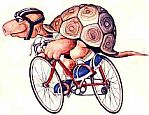
![]()
People Bicycled With Us

|
|
||
 |
People Bicycled With Us |
 |
|
|
||
|
|
||
|
|
Pieter & Judy Malcolm & Rose |
|
|
|
||
|
|
Dear Boris I just want to thank you SO SO much for the most wonderful 2 weeks. You were the most wonderful guide and friend and gave us all an incredible Bulgarian experience. The trip far exceeded my greatest hopes. Best wishes for a great trip, good weather and a safe tour and we are all SO looking forward to having you and Ilka with us in Cape Town. The best is definitely in front of us. THANKS JUDY !!! |
|
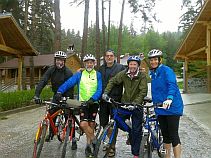 |
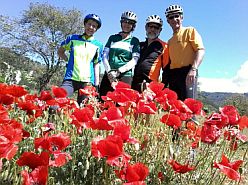 |
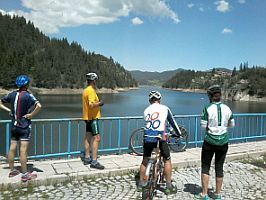 |
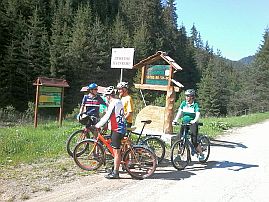 |
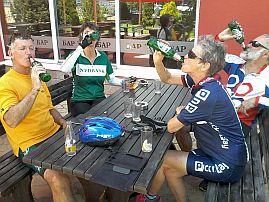 |
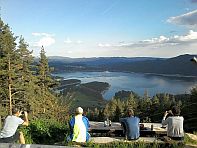 |
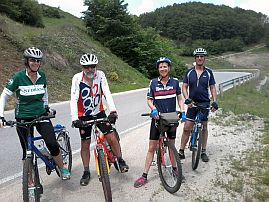 |
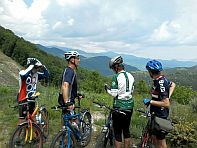 |
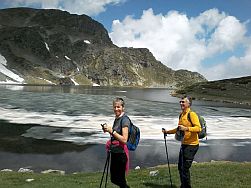 |
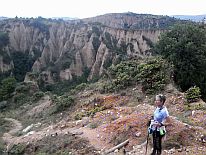 |
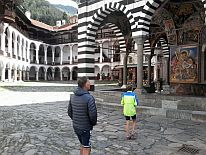 |
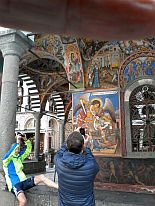 |
|
Judy's description of the tour: Trolling the internet in my research into an Eastern European cycling holiday (read, affordable), I came across the website of Boris Borisov, our soon to be guide and good friend. http://bgbybike.we.bs Without doubt, Boris was our best find and entirely responsible for our most wonderful trip to Bulgaria. We communicated via internet for months before our departure in late May and he was always extremely responsive to my comments and queries. In fact, by the time we arrived in Sofia, Boris was already a friend! Our bikes were supplied – not sophisticated but adequate. Our accommodation was sorted – not sophisticated but more than adequate and our transport was sorted for us whenever required. Bulgaria is not a country that I would like to tackle without a guide and in fact for my taste, it is a country ideally suited for an active cycling or hiking holiday. In a country with a Cyrillic alphabet, getting around independently is more of a challenge than many. English in the cities is widely spoken but in the outlying country areas it is really only the young, and there are not too many of them around, who speak English. Prior to arrival we settled on a route which would be extremely flexible, exploring the Rhodope mountain area situated in the south west part of the country. The distances covered were discussed with Boris before we left and averaged approximately 35-45 km per day. The gradients chosen were gentle to flat and being springtime, the countryside was beyond spectacular. After being met at Sofia airport, Boris spent the afternoon guiding us through the historic part of Sofia before we settled down to enjoy our first meal at a local restaurant. The food throughout our trip was extremely tasty and very reasonably priced. Bulgaria is a long established wine growing area so the wine was plentiful and good. We especially enjoyed the Mavrud – a cultivar unique to Bulgaria and we thought rather good …and then there is the Rakia……, the local spirit of choice, which is similar in taste to plum brandy. Our first few days were chilly and at times slightly drizzly but certainly didn’t do anything to dampen our spirits. On day one we caught a train from the rather austere Sofia station to Belovo – we had planned to get off at Vakarel (SE of Sofia) but due to persistent rain got off at a lower altitude and then cycled 20 km to the mineral spas at Varvara sadly missing 50 km of downhill riding. En route we saw many white storks nesting on lamp posts and power lines. We bought fresh cherries and tomatoes from a farmer on the side of the road which we used for our lunch of bread, white cheese and sausage. Swimming in the warm spa water was rejuvenating and relaxing after the somewhat cold ride. Judy and Pieter went on a very pleasant walk up the mountain following way markers en route. The following day Boris and Ilka his partner met us early for a typical Bulgarian breakfast of good Bulgarian yoghurt and bread (Banitsa) stuffed with herbs and white cheese. Then off we went to the somewhat laid back railway station to catch the narrow gauge passenger train up the mountain to Velingrad. Our tickets for the trip and for our bicycles were written out by hand using carbon paper! Departure of the train was delayed 45 minutes due to a rock fall on the mountain track and passengers milled around the tracks patiently waiting. Once we had set off we were treated to spectacular views as the rail line and road follow the raging river up the mountain which was bathed in all greens of the solid forest which covers the mountain. We took our bikes from the train at Velingrad station and after welcome hot drinks started the 17 km climb up the next mountain pass en route to Yundola. A long relentless climb broken by the sound of cuckoos calling in the forest, beautiful flowers of all colours on the side of the road, shepherds herding their flocks of sheep with their sheep dogs and the smells of freshly cut pine logs being loaded onto trucks. The cool weather helped make the long climb manageable and on arrival in Yundola we found a market selling honey of all colours, fruit, jams, beans and cheeses – all homemade. The temperature on the outside of the lodge showed 8 degrees, however, I must admit I feel colder in Cape Town as inside we were as warm as toast! After a picnic lunch washed down with beer and wine and ending with sweet black cherries and a local raisin cake lathered in strawberry jam it was a lie down for some and a sauna bath for others. Thermal pools are a big feature in the Rhodope area and an unexpected bonus on a cycling holiday! Once we had left the drizzle behind we had a glorious ride down the mountain where we passed numerous fountains with drinking water beside the road, people hard at work in their small agricultural lots (beans and potatoes), small honey stands and people walking in fields harvesting snails which were bigger than any snails I had ever seen in my lifetime! After 65 km the previous day we had a day off our bikes and Boris took us to the Pirin mountains where we caught a 3.5 km ski lift up to 2250m. This cost 15 lev each return (R112). On the way up we passed unmelted snow and an array of trees showing their spring colours. Conifers with red candle like cones and others with tiny, hard little bright green shoots. At the top we ventured yet further up on a path which criss crossed crystal clear streams created by the melting snow. The tree line ended at the end of the ski lift and we walked up for an hour seeing mirror like lakes being fed by cascading rivers falling over decomposed granite rocks covered in an array of lichen in greys, greens and browns. The next day, after a 50 km pedal and relaxing swim Boris took us on a drive into the mountains where we drove through 3 ancient villages with beautiful views down the mountain. A lot of derelict and abandoned houses in the Christian villages as the population have decreased over the years while the Muslim villages were in comparison alive with people and children. The stonework on all the houses was fascinating and of a very high standard. While at the end village 3 horse drawn carts with 8 nomads and dogs were trekking back into the mountain for the summer. Their worldly possessions, albeit very sparse, were on the back of the wagons. 2 of the 3 horses drawing the carts had foals running next to the carts. These people live off the mountains harvesting berries, mushrooms and other edibles were possible. Such a simple life but for us it was like a time warp having time to drink it all in. Before supper we went to the top of the town for sundowners where we had a fantastic view as the sun was setting. We had noticed many white and red braided ribbons tied to trees and Boris explained to us that every year Bulgarians welcome the coming Spring on 1 March by participating in a traditional exchange of ornaments made of red and white threads called Martenitsa. These are figurines to be pinned to the chest, bracelets or worn around the neck. The day is known as Baba Marta (Grandmother Marta) – a benevolent but unpredictable old lady. These are exchanged all around between friends and family and even tied around the necks of pets and cattle and are meant to guarantee a healthy and fruitful year. Bulgarians are then obliged by tradition to wait until they see a stork – a sure sign of spring’s arrival and then tie their martenitsa to a blooming tree. The next day, to save our legs, we started a bit later and were bussed (30 Km) up the Rhodopy mountain. The cost was 60 lev for all of us and the van took us from 590 m to 900 m. which we reckoned was well worth the price! We then rode 43 km up to the town of Dospat – past numerous trout farms, men working on stone and slate for houses and walls, across a dam wall and wherever we were riding past lots of flowering May, Mock Orange and Tamarisk. Day 7 we entered the Yagodina gorge which is an absolutely breathtaking area and there was no chance that we were going to rush our time there. The gorge has towering sides of over 200m and follows the Buinovska River to the caves which we toured with a group. After biking up to Yagodina village those who still had the energy, hiked up to St Ilia and the “Eagle Eye” which is an amazing platform over a precipice looking down into the gorge. The walk up the mountain was a round trip of 3 hours through beautiful countryside and the view from the top incomparable. That particular night was spent with a local family in Yagodina who prepared the most delicious trout on an open fire for dinner and next morning we were treated to homemade “banitsa”, yoghurt and wild wood strawberry jam. Oh my goodness, we were in heaven. In fact our breakfast was such a generous meal that we were able to snack on the banitsa throughout the morning while en route to the “Devil’s Throat Cave” or Dyavolsko Garlo. This is where the river goes into the ground, falls 50 m and then reappears 300 m down river. Just before Devin we turned up the hill going south and climbed 350m over 16km, past many trout farms and on to our hotel at Shiroka Laka, a town famous for its authentic Rhodopean houses and singing tradition. We were in fact fortunate enough to see local children in traditional outfits and hear some of the singing at a music school across the road from our hotel. On we pedalled enjoying a lovely long decent (500m) and stopping at a little road side café where we had the most delicious homemade chicken and bean soup washed down by local beer. While we were eating a good thunder and lightning storm erupted so we had timed our stop very well… or so we thought. Storm over we remounted for the last push to the Hotel Chilingia overlooking the fish farms on Lake Vacha - known to be one of Bulgaria’s prettiest lakes but before we arrived we were caught in a downpour of note and arrived looking like drowned rats. During the next few days we continued to cycle through the most beautiful countryside. Through small, unspoilt villages where we enjoyed delicious meals and coffee with locals. Passing through one such village we stopped to admire the roses and the owner broke off and offered us a branch of cherries off one of her trees. Such cameo moments make a holiday so memorable and Bulgaria certainly had plenty of those moments. On our way down to the lower plains we cycled past vineyards, fields of blood red poppies, sunflowers not yet in bloom and wheat fields just starting to turn a golden brown. We stopped next to mulberry trees where we ate our fill on the juicy dark purple fruit which left our fingers stained and our tummies full. Our final push was to the city of Pazadzhik and our hotel for the next 2 days. Boris gave us a guided tour of Bulgaria’s second biggest town Plovdiv which is one of the oldest cities in Europe. Plovdiv has been selected as Europe’s city of culture for 2019 and is a city full of millennia old ruins and interest. I was also delighted to be able to visit the 7 Rila Lakes which I had heard to much about. We caught a ski lift up to 2000m and as the clouds cleared we hiked up to 5 of the lakes (2400 m) which were absolutely stunning. We visited the charming town of Melnik in the centre of the wine growing area where we hiked up to the sand pyramids which to me were reminiscent of Cappadochia in nearby Turkey. The pyramids are located on 17 square km around the town and have formed over the centuries as a result of wind, rain and the constant erosion of the limestone cliffs. The following day and sadly the last day of our holiday we went to the Monastery of Saint Ivan of Rila, better known as the Rila Monastery which is the largest and most famous Eastern Orthodox monastery in Bulgaria. The monastery is in the Rila Mountains and today is the home to around 60 monks. After exploring Rila we had our last pedal 30 km down the hill next to the Rilska River before making our way back to Pernik and on to Sofia for our flight back to South Africa.
|
||